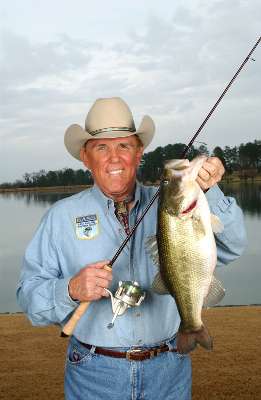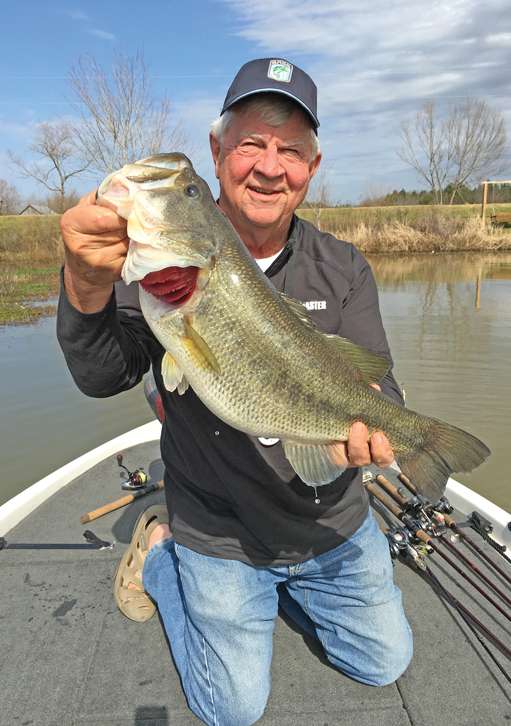
Ray W. Scott turns 80 years old Saturday, Aug. 24. In observing this milestone, I think it’s appropriate to celebrate the evolution of the sport of bass fishing and Scott’s impact on it.
Born Aug. 23, 1933, in Montgomery, Ala., Scott was just 33 years old when he got the wild idea to hold a big-time, high-stakes bass fishing tournament on Beaver Lake, Arkansas. He was 34 when he began organizing the bass fishermen of America into a cohesive, powerful force for the good of the sport. He called his group B.A.S.S., the Bass Anglers Sportsman Society.
It’s hard for me to believe that (a) Scott has already reached that age, and (b) that the sport has come so far in what seems to me a relatively short time.
Sure, fishing tournaments were already being held before Scott conducted the first All-American Bass Tournament on Beaver Lake, Arkansas., in 1967. Hy Peskin’s World Series of Fishing was in full swing by then, and Earl Golding’s Texas State Bass Tournament had been launched a dozen years earlier. But none of those early trails would ever have the nationwide, enduring impact on bass fishing that Scott was able to achieve through B.A.S.S. The other organizers simply couldn’t match the promotional firepower Scott brought to bear.
Nor could they rival his salesmanship.
A recent example: When I called to talk to him for this article, Scott was happy to reminisce about the founding of B.A.S.S. and his impact on the sport. But he also wanted to mention his books, The Bass Boss and Prospecting and Selling: From a Fishing Hole to a Pot of Gold, and his Trophy Bass Lakes resort — and give phone numbers for ordering. Somehow he convinced me to list his website (www.rayscott.net), where you can learn about all those things and more.
Alabama B.A.S.S. Nation president Eddie Plemons had a similar experience when he visited Scott a few weeks ago to pick up some gifts for the new High School B.A.S.S. champions. Scott invited him into his office for a chat.
“As Ray told his stories, he would stop every now and then and try to sell me something,” Plemons reported. “That’s classic Ray Scott. He sold me a limited edition Ray Scott Daisy BB gun and a brass belt buckle. He said, ‘I usually get $80 for that BB gun, since there were only 25 made.’ I told him I only have $40 in my pocket. He said that would do, and he took my money. Soon, I had a limited edition brass belt buckle, a first edition of the 1967 All-American Tournament patch and a backseat full of items signed by Ray Scott, plus the BB gun. As I struggled to get out the door, he handed me my 40 bucks back! You see, with Ray, it’s all about the sale.”
In the same way, Scott sold bass fishing to an eager market of everyday anglers more than 45 years ago. With a few thousand dollars of borrowed money, Scott launched a movement that would help spawn an industry variously estimated at more than $25 billion and one that would make the black bass the No. 1 sportfish in America. But there’s more to his story than money and popularity.
I asked him to reflect on his life and the accomplishments of which he’s most proud.
Scott recalled his childhood days of bicycling to the banks of the Alabama River near his hometown and fishing from the bank. He was disgusted at the filth that floated by. “Every toilet in Montgomery flushed right into the river,” he said. Remembering that formative impression, he channeled the clout of B.A.S.S. into cleaning up bass waters in Alabama and throughout the nation. He filed lawsuits, and he launched his “Peg A Polluter” campaign to identify sources of toxic discharges. Those activities had a major impact on the clean water initiative in America.
Years later, he fought tirelessly to expand excise taxes feeding the Sport Fish Restoration Fund. Through the efforts of Scott and his allies, the Wallop-Breaux Amendment was passed in 1984 and is now pumping nearly $600 million per year into state programs to improve fisheries. “It’s the lifeblood of fisheries departments,” Scott said.
A tragic boating accident that took the life of a friend early in B.A.S.S.’s history prompted Scott to add boating safety to his list of crusades. Over the objections of his outboard sponsor at the time, he issued an edict that all tournament boats had to be equipped with “kill switches” that would stop the engine immediately if the driver moved from his seat. The devices are standard now on bass boats everywhere.
His requirement that anglers in his tournaments wear life jackets when their engines are running has saved numerous lives in and out of competitive fishing.
Scott’s crowning achievement, he and I agree, was making catch and release an almost universal ethic among bass anglers. His mandate in 1972 that tournament boats be equipped with aerated livewells may have been motivated in part by self-preservation — to counter critics’ claims that tournament fishermen were raping the resource — but it spread rapidly from the pros to everyday fishermen.
Reminiscing about the birth of B.A.S.S., Scott attributes his success to a string of miracles.
Why would God get involved in what Scott was trying to accomplish? I asked.
“Because it was good for people,” he answered instantly.
“I have a vision of Johnny Lunchbucket going out on a lake and catching the biggest bass of his life,” he continued. “He wants to take the bass back and show it off to his family and friends, but instead he looks at it squirming in his hands, smiles and gently lets it go, someday to be caught again.
“That’s how I know it was right.”
In more ways than we can imagine, you and I are beneficiaries of Scott’s hard work and accomplishments.
Happy birthday, Ray!
Click here for images of Scott throughout B.A.S.S.’s history.

